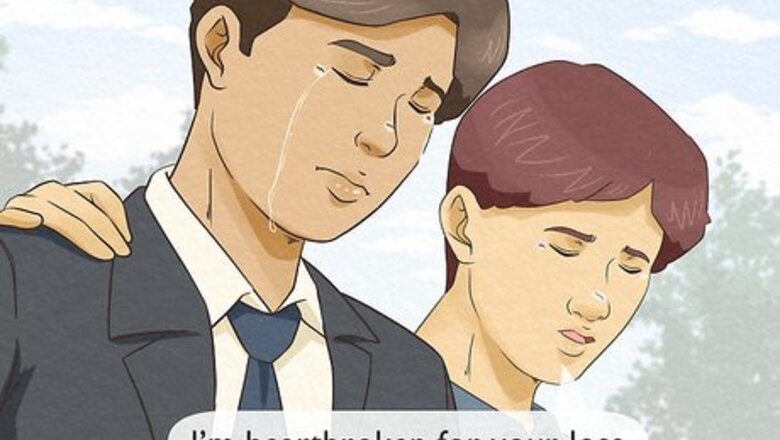
views
- Express condolences to friends and family with statements like “I’m sorry for your loss,” “You’re in my prayers,” and “If you need anything, I’m here.”
- If you’re giving a eulogy, talk about the person’s life, personality, and relationships. Include sweet, inspiring, or funny anecdotes, and make it 5-10 minutes long.
- For shorter speeches, tell a story illustrating the connection you shared with the person who died. Choose something personal and special to share.
Expressing Condolences
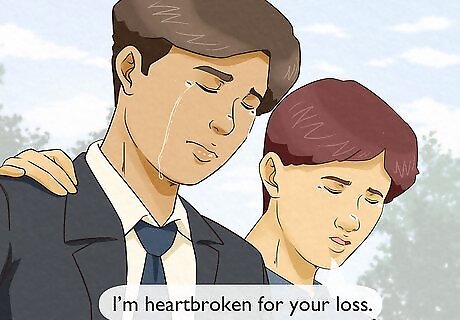
“I’m sorry for your loss.” Don’t underestimate these simple words. They can mean so much to a grieving person, and they’re familiar enough that anyone will know what you mean. Steer clear of statements like “They’re in a better place” or “At least they’re no longer suffering.” Grieving family members aren’t necessarily able to look on the bright side, so it’s best to just acknowledge and validate their pain. Instead, try things like: “Please accept my condolences” (if you want to be a bit more formal). “My deepest sympathies to you and your family.” “I’m heartbroken for your loss.”

“I’m speechless. I have no words.” Sometimes, words fail us, and that’s totally okay. Admitting that you’re at a loss for words isn’t selfish or silly—quite the opposite. It acknowledges the enormity of someone’s loss and assures them that their pain is valid. Out of respect, it’s best to avoid asking questions like “What happened?” or “How did they die?” But you can always use these alternatives: “Words can’t express how sorry I am for your loss.” “I’m stunned. I’m so, so sorry.” “This is such a loss. I just can’t believe it.”

“They were my best friend. I’ll miss them dearly.” Use this to convey that the person who died meant a lot to you. Their loved ones will appreciate hearing it, since they’ll be missing them just as much—if not more. Depending on your relationship with the person who died, you could say: “They were a wonderful neighbor” “They were such an important member of the community.” “I’m so grateful to have had them in my life.”
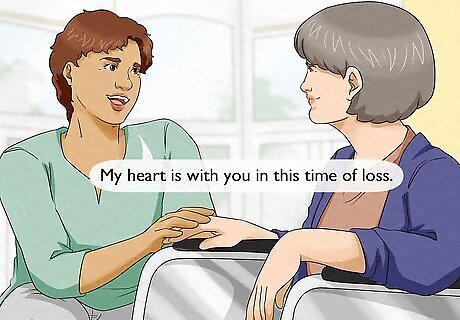
“You’re in my prayers.” Religious gestures like this can be incredibly heartwarming, especially if the family of the person who died is religious as well. Of course, nonreligious people may also appreciate being told “You’re in my prayers.” Depending on your faith, or theirs, you could also say: “May God comfort you and your family,” “God be with you,” and so on. “My heart is with you in this time of loss” (if you prefer something more secular).

“It was such a pleasure to work with them.” This is a wonderful thing to say when the person who died was your coworker or boss. Work relationships are important, and losing someone you work with can be devastating. Speaking highly of them as a colleague is the perfect way to express your condolences. You could even add: “They were a great leader.” “I learned so much from them.” “They were such an inspiration.”
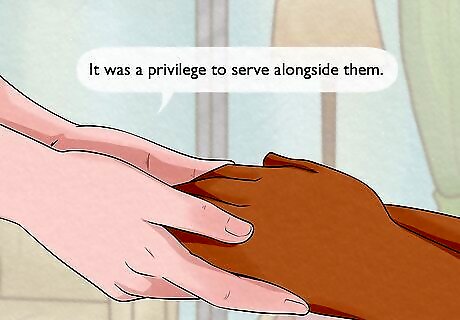
“They served with great distinction.” If the person who died was a military servicemember, veteran, firefighter, or police officer, there’s no better way to honor them than to acknowledge their service. It’s best not to mention the circumstances of the person’s death, especially if they died in combat or while on the job. But depending on your relationship with them, you could say: “It was a privilege to serve alongside them” (if you served together and had similar ranks). “It was an honor to serve under their command” (if they were your superior officer). I’m grateful for their service to my country/community” (if you’re not a service member, or didn’t serve with them).
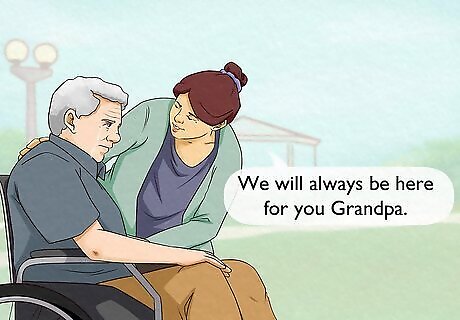
“If you need anything, I’m here.” Say this to show that your compassion isn’t limited to the funeral. Grieving people may still need support long after their loved one dies. To show your support, you might be tempted to ask questions like “Is there anything I can do?” or “Do you need anything?” Instead, make yourself available to them by saying one or more of the following: “Reach out to me anytime, for anything” (to show that you’ll still be emotionally supportive and available in the future). “If you need to talk, I’m only a text or phone call away.” “My door is always open.”
Writing & Delivering a Eulogy
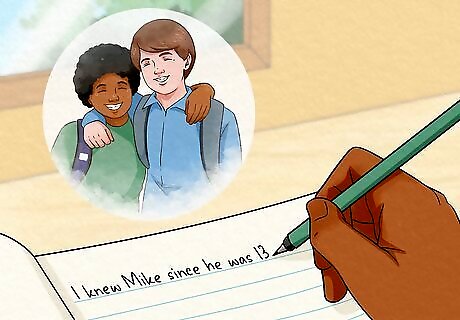
Begin with a quick, personal story about the person who died. Start with something like “As some of you know, I met Amanda in…” or “I knew Mike since he was 13….” From there, share a story that illustrates their character, sense of humor, and other traits that made them unique. Keep this introduction 1-2 minutes long. Some stories you could tell include: A funny or heartfelt memory you shared together. The day you met, or your earliest memory of them. A story they shared with you about their life
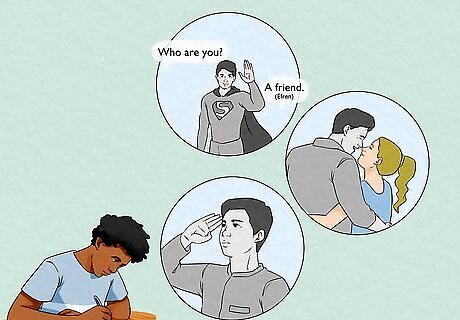
Continue by talking about their life and relationships. Make a list of stories you could share, then choose 3-4 and write them out in detail. Include stories about their hobbies, interests, friendships, personality, and professional achievements. Avoid embarrassing or negative topics, and make sure your tone is appropriate for the situation. For instance, a eulogy for a young soldier who died in combat might be quite formal and somber, while a eulogy for a grandmother who loved practical jokes might be more light-hearted and touching. Make each story 1-2 minutes long. Some topics could include: Jokes they loved to tell. What they were like when they were young. The way they raised their children (if they had any) Their relationship with their partner or spouse Things they did with friends (vacations, outings, pranks, and so on). Their careers (especially major accomplishments or honors) How hard they fought while they were sick (if they passed away from an illness)
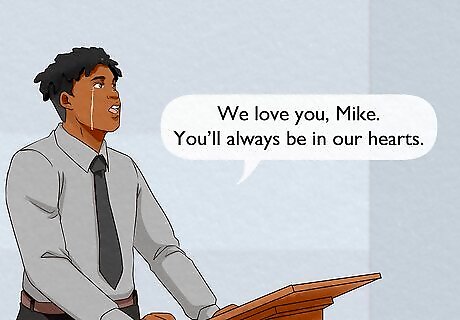
End with something simple, like a prayer, quote, or final story. If the person who died was religious, read their favorite passage from a religious text. If not, share a quote from an author, poet, musician, or public figure they admired. Share one last story about them, such as the last moments you spent together. Or close with a simple, loving statement, like “We love you, Steven. You’ll always be in our hearts.” Keep your closing remarks under 2 minutes long. The eulogy should last 5-10 minutes, in total. Write down the eulogy and bring a copy with you. Read from it if needed.
Giving a Short Funeral Speech

Share a memory or personal story about the person who died. Some funerals offer the chance for attendees to say a few words in addition to the main eulogy. Share a 1-3 minute story that will give attendees a sense of the connection you had to the person who died. It can be heartwarming, inspiring, funny, or all of the above. Always speak positively about the deceased person and avoid embarrassing or negative subjects. Some possible topics include: How you met the person who died. A funny moment you shared. A trip or adventure you went on together. An activity or hobby you both enjoyed. A time when they helped or supported you. Memories from when you were both young.




















Comments
0 comment